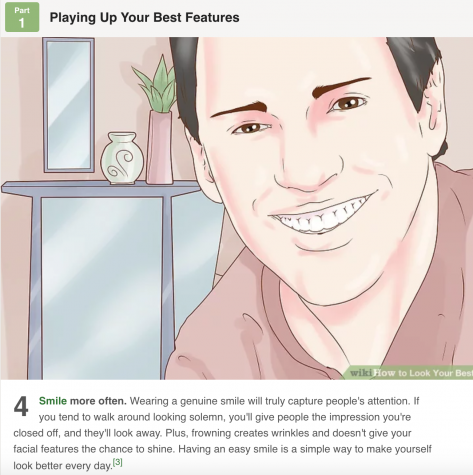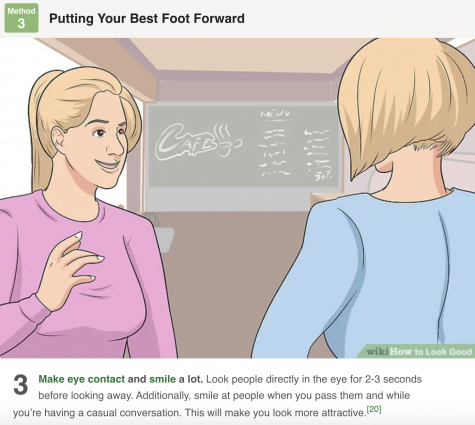Why I smile
How I started to adopt the seemingly trivial practice of smiling more often
October 25, 2019
Resting b—- face (RBF). “A sullen or scowling expression attributed to or unconsciously adopted by a person when in repose,” according to Google. “She has taken flack for what some have called her resting b—- face.”
Funnily enough, I first learned about the concept when I eavesdropped on a group of girls “giving flack” about a classmate and his naturally angry expression. Picking up bits and pieces, I heard them talk about how, despite having attractive features, his resting face was intimidating and kept them from engaging in conversation with him.
A few years later, I really started thinking about the term when my sister joked about always having to deal with her RBF. Friends and relatives have always told me and my sister that our faces look alike, so my sister’s comment about her face got me wondering about my own appearance. It occurred to me that I also had a RBF, and I might have unknowingly spurned dozens of people from approaching me without any knowledge of it.
Somehow, I began to Google the topic and fell into a rabbit hole browsing through YouTube videos and WikiHow articles. Every article I found pointed to smiling as one of the best fixes to RBF, with the added benefit of capturing people’s attention and boosting one’s appearance.

I decided to make it a personal challenge to conquer my RBF and replace it with a less intimidating demeanor. For several days, I spent a few minutes in front of my bathroom mirror trying to gain a feel for what I looked like in a neutral state. I played around with my smile, testing how I’d look when I raised the corners of my lips or lifted my eyebrows. After experimenting with how much teeth I should show while smiling, I eventually settled on a smile which I deemed as natural as possible.
Ironically, it felt completely unnatural to smile throughout the day when I had gone my entire life without thinking about it. My face became slightly numb as I kept adjusting my smile each day, and I went to the bathroom multiple times just to make sure I wasn’t overdoing it. For weeks, I felt foolish about putting so much effort into smiling, but I was empowered by an unexplained urge to prove it was possible to overcome my RBF.
Pretty soon, I noticed more changes in my everyday life than simply having a gentler resting face. Whether waving to a friend in the hallway or conversing with a classmate, I felt more engaged and grounded with the people around me. A rush of satisfaction pulsed through my body whenever I smiled at someone and they smiled back, and the joy of sharing these bits of positivity drove me to continue my mission of smiling more often.

As weeks of smiling soon blurred into months, I found that my personality had also begun to shift. After getting a taste of having genuine, positive interactions with my friends, I tried to maximize that feeling in my life, whether that meant starting a conversation with someone I’d never talked to before or saying “hi” to random classmates I passed in the hallways.
While I still stuck to my goal of fighting against my RBF, smiling had a new significance to me. It helped me break out of my introverted personality without feeling unnatural, in the form of a positive feedback loop; being able to walk to my next class and share a smile with friends passing by only reinforced my desire to continue the habit of smiling. Even when I’m interviewing sources to write an article, I can sense how comfortable some people get when I simply ease them into conversation with a smile.
Over the years, some people have come to describe me as a cheerful person possessing a bubbly personality and lots of energy. Ironically, my personality was never something I’d expected to improve upon by working on my smile — I thought I’d simply work to overcome the RBF I was given. It’s apparent to me now, though, that smiling impacts my energy level and attitude far more than it’s changed my appearance. To this day, I’m not sure if I’ve fully overcome my RBF, but my pursuit of conquering the annoying condition has provided me with a habit of smiling that has now become irreplaceable.


















